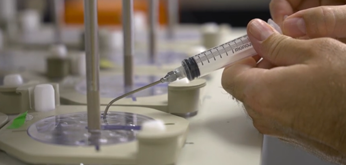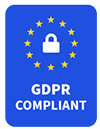16th February 2022
%20(1).jpg?width=800&name=Sleep%20(2)%20(1).jpg)
Whether your week tends to comprise of varied shift work, or the consistency of the 9-5; whether you’re fresh out of university, or a tenured professional in the working world, we all share the same underlying need: for healthy, refreshing sleep.
It’s no secret that adults need a minimum of 8 solid hours of shut-eye each night. Even if you’ve not read the research explaining why, you’ll know from experience that poor sleep leads to a poor day - heightened irritability, an inability to focus and general drowsiness that limits your productivity.
In the health and safety space, focusing on wellbeing as a part of safety is a must - and sleep certainly is the cornerstone of wellbeing. Those who are working in risky jobs that require an alert mind with high attention to detail are most at risk from poor sleep. It comes as no surprise to hear that a sleep-deprived employee will have greater difficulty focusing on tasks, which can lead to poor decision-making - and create riskier situations.
From a health and safety perspective, it’s no different. Certainly, poor sleep is a critical factor that often underpins preventable workplace incidents. Without a doubt, it’s up to us as leaders to evaluate how we approach the work-life balance in the office and consider ways to encourage employees to feel more rested.
What can companies do to support employees’ sleep?
Sleep leadership
In a recent article, BBC examined the idea of sleep leadership. The concept looks at how our leadership team approaches the idea of sleep - especially in tech industries, notorious for celebrating little sleep - and how that can culturally affect workers.
If managers are sending emails in the small hours of the morning, or notifications are pinging just as you’re settling down with a tub of ice cream to watch some much-needed reality TV, chances are, sleep leadership in your workplace is poor. The message sent to employees is that work comes first and rest comes second.
Any health and safety practitioner can attest to the fact that poor sleep is a number one root cause factor that’s behind workplace incidents. No one’s immune.
According to the Sleep Foundation, drowsy drivers begin to bear similarities to drunk drivers, if the driver’s been awake for 18 hours straight. While drowsy driving is not the same as drunk driving, a lack of sleep can impair reaction times, alertness and critical decision-making, in a similar fashion.
If the people at the top can promote healthy sleep habits - even going as far to encourage naps or late lie-ins - then your team will likely benefit from decreased stress levels and a better overall sense of rest.
Incentivise sleep:
If you’ve realised that your organisational culture is perhaps lackadaisical about encouraging a better sleep culture, there are a couple of approaches that you can embrace, that will incentivise better sleep.
Encourage a positive narrative about sleep. While we’re collectively embracing the value of self-care and looking after our health - especially during the pandemic - as a society, sometimes we slip into archaic mentalities that equate more sleep with laziness.
It’s important that we both engage in good sleep leadership from a top-down level, and make sure that we’re referring to sleep positively in a day-to-day scenario.
Some companies have taken it a step further than just encouraging good sleep: they’ve provided their employees with a designated napping area in the office, that includes nap pods, designed specifically to accommodate an individual who needs a good 20 winks.
Research supports this idea and suggests that a 20-minute power nap doesn’t necessarily interfere with night-time sleep. Furthermore, researchers have found that the 20-minute power nap has a positive effect on alertness, focus and a general sense of feeling refreshed.
Certainly, some companies might think that’s a shade too far - nap pods are reminiscent of high-powered Silicon Valley tech start-ups - but the idea perhaps, shouldn’t be slept on.
What can you do at home to help yourself?
While companies can help encourage better sleep to a certain extent, getting in those hours really comes down to us as individuals. And it’s not always as simple as aiming to just go to sleep earlier. Factors such as technology, kids, stress or chronic illnesses all affect how we sleep.
While some of those issues may need help at a deeper level, there are a few things you can do to help alleviate general stress, and get yourself in a physically optimal state for sleeping earlier.
Maintain a good work-life balance.
WFH has its perks, we’ll be the first to admit. No commute in the morning, only a short walk away from the tempting fridge and pantry full of goodies to help you (go on, you deserve it). Seeing your family’s joyful faces more often and having 5 minutes to walk outside and have a good stretch.
But there’s one real issue that plagues us - and that’s struggling to switch off at the end of your day, and instead continue working well into the evening. In a survey, we found that people report that their greatest struggle working from home is experiencing weaker work-life boundaries. Normally, in an office environment, once we’ve finished our day, we clock off and leave - work stays and work, and home is for rest, and enjoying the other things in our lives.
However, as many of us found during various lockdowns, was that push to just finish that final task, even at 7pm, or to use our phones in bed and send that final email. Feeling constantly on directly affects our stress levels, and as a result, can have a serious impact on our sleep. Furthermore, using phones or excess screen time in the last half hour before we sleep can interfere with our circadian rhythm, making it more difficult to actually fall asleep.
If you’re working from home but still struggling to get in 8 hours of sleep each night, try evaluating your work boundaries, and note if you struggle to switch off at the end of the day. It might help to write a to-do list when you’re finishing up, to make sure you’ve got your priorities written down, ready for the following morning - and keep your mind from ruminating on work-related matters.
Reduce coffee.
Yes. That third double-shot at 2pm really is a double-edged sword.
%20(1).jpg?width=800&name=Sleep%202%20(2)%20(1).jpg)
Get professional help
If feeling chronically exhausted is an issue you’re dealing with, consider visiting a sleep clinic. Sleep clinics are designed to help treat those experiencing insomnia or having trouble sleeping through the night.
Certified sleep psychologists can help with a range of issues, from insomnia to sleep apnea or even Restless Leg Syndrome. Sometimes the answer to why you’re experiencing poor sleep goes beyond the over-consumption of coffee - and needs a more serious solution from a designated professional.
Final Words:
Hopefully, this article hasn’t made you yawn. If it has, it might be a sign that you’re missing out on your good-quality 8 hours of sleep.
Good sleep is a fundamental element of wellbeing and we all have a responsibility to encourage healthy sleeping behaviours as a means of keeping ourselves, and the people around us, safe at work.
If we encourage good sleep from top-down in organisations, we help to shift the narrative that celebrates sleepless nights, equating them to productivity and success. Instead, we can promote the idea that sleep is essential for everyone (a lie-in isn’t lazy!).
So go on, have a nap.
- Want to know more about how to create a better health and safety culture? View ecoPortal smarter safety videos. ecoPortal health and safety software can also help your business. Try a demo or get in touch with the team at ecoPortal.







